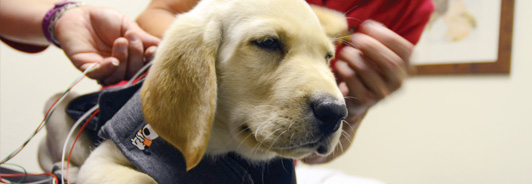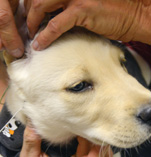Go FETCH
Second of its kind in the country, new lab will provide hearing tests for puppies, expanded training for students
Story and photography by Dan England
Using the kind of tone only a newborn, kitten, or in this case, a puppy can inspire, Peter Scheifele leans into the furry face of a 7-week-old yellow lab and lavishes her with praise and pets.
This particular pup just had some wires inserted into her ear and put up with a test that would measure her brain activity in response to clicking sounds. Some puppies cry at or yip at the noise, and others squirm because, well, they’re puppies. But this little one was a champ, and that melted the serious scientist’s heart.
“Wow, that’s great,” Scheifele says. “You’re a good girl. Such a good puppy.”
Snuggles aside, Scheifele is all business. He’s at the UNC Audiology department to train faculty on how to use his Facility for Education and Testing of Canine Hearing & Laboratory for Animal Bioacoustics (FETCH LAB). Once it’s installed, UNC will be only the second university in the country to use the program he started at the University of Cincinnati.
The program will give UNC professors, and eventually students, the ability to not only test animals’ hearing but to take it one step further by diagnosing the problem and possibly even treating it. It will give students another way to train to test infants’ hearing and to get certified in animal audiology. Having that skill could help them land a job in a zoo or expand their own practices to include breeders and their dogs.
Scheifele started the program in 2007 because of the profound problem of deafness in dogs. More than 80 breeds have hearing problems tied to genetics, he says. Dogs also develop problems when they are boarded in a kennel or forced to stay at shelters. And age plays a part.
“Anything they can get, we can get,” Scheifele says about the dogs’ causes for hearing loss.
He owes a lot to the groundbreaking work of George Strain, a professor of Neuroscience at Louisiana State University whose studies helped expose the genetic problems causing deafness in dogs. He developed ways to test dogs.
“He’s the father of all this,” says Scheifele, assistant professor of Bioacoustics and Hearing/Speech at UC. “He got people to see there was a problem.”
Of course, measuring a dog’s hearing is tricky. That’s the reason for measuring their brainwaves.
“It’s not like a hearing test you took in school as a kid,” Scheifele says. “They can’t raise their right paw.”
Infants can’t raise their right hand either, and that’s a big reason why UNC will bring FETCH LAB to its students.
“Testing for puppies is identical to testing for infants,” says Katie Bright, professor of Audiology and the director of UNC’s FETCH LAB. “But we don’t have enough infants for our students to learn that process. This seemed like a great solution.”
In addition, breeders have to prove their dogs can hear before they place them in homes. Bright says the program will not only teach students how to do that for breeders but also allow them to get certified in animal audiology. Many veterinarians don’t want to test puppies because the equipment is expensive, Bright says.
The Audiology department hopes to offer the certification this fall and will also offer equine hearing tests.
“There’s a whole new field of animal audiology,” Bright says. “Some students are even concentrating in it. So this program would meet two needs.”
Solutions are tougher for dogs with hearing impairments, Scheifele admits, but there are tools, including a vibration collar and even sign language.
“We have put hearing aids in dogs as well,” he says. “We’ve even done cochlear implants, but those are so darn expensive.”
The idea is to diagnose the problems and next steps could include referrals to specialists. Three professors — including Bright, Tina Stoody and Jenny Weber — will oversee the program. Weber’s just fine with that. She has three labs of her own. In fact, you wonder if Weber got more out of the puppy time than the training.
“You’re such a good girl,” Weber said as she stuck her face close to one of the labs. NV






